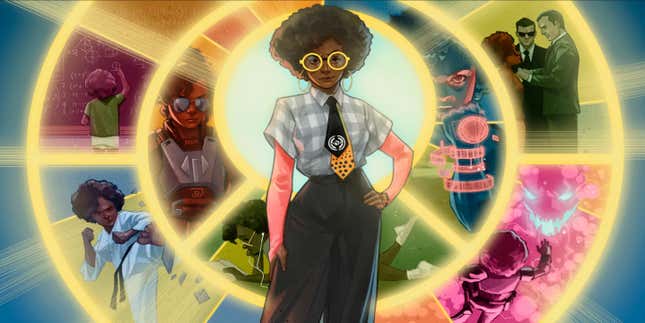What makes Fortnite so engaging? Ask players what they love, and there’s a number of things they might mention about the hugely popular battle royale. The gameplay loop is fun, with solid third-person shooter controls and the unique complexity of its building mechanic nicely complicating the simple quest to be the last person standing. It has grown to encompass media franchises from Marvel to Naruto to Alien, letting fans play as any number of beloved characters from across the media multiverse. Amongst all the reasons players say they love Fortnite, though, the game’s story is rarely mentioned. For that matter, people would be forgiven for not even realizing Fortnite has a story. That would be a mistake though, as Fortnite has consistently taken advantage of all of its mechanics and reach to deliver a story that’s unique, compelling, and deserves far more love than it gets.
Fortnite brings the spectacle, from a rocket launch to The Rock
When Fortnite first launched its Battle Royale mode in 2017, there wasn’t a story at all. It really was just a new competitive multiplayer mode spun out of the fun base defense game Epic Games had originally envisioned Fortnite to be. It wasn’t until spring 2018, when a meteor struck the map after weeks of growing larger in the sky, that things really kicked off on the narrative front. From that point on, Epic began spinning a web of lore and story events that have spanned multiple years and four maps, with each new island serving as a new “Chapter” for the game and its constantly unfolding story.
In its biggest moments, that story is all about delivering massive spectacle. Even from the beginning, the story of Fortnite has been the source of huge, jaw-dropping occurrences of the sort that we rarely see in shared multiplayer worlds. In June 2018 the game hosted its first ever live in-game event, in which a rocket was launched into space, only for it to turn around and set its sights on the island. Just before it would have struck the city of Tilted Towers, an interdimensional rift opened which transported the ship to a different part of the map. Before it was all over, a number of rifts had been opened in the rocket’s wake, rifts of a sort that still affect the story to this day. No mere cutscene, this event took place in live player lobbies, which led to a player claiming what was then the world record for eliminations in a match when they broke the platforms others had made to watch the rocket, sending over 40 players tumbling to their doom. (Epic learned their lesson, and now live events take place in special sessions that prevent player death.)

G/O Media may get a commission
As the years and seasons pass, Epic has consistently increased the spectacle of Fortnite’s story. The big events make the headlines, from giant kaiju fights to black holes to fighting Galactus himself, and those events are fun. But even in the periods between the climactic show-stoppers, Fortnite’s story has grown more sophisticated. Where at first the story was told mostly through environmental clues, over the years the game has added some voices that are easy to recognize. Several main characters carry the voice and likeness of major actors like Dwayne Johnson and Brie Larson, while others are played by seasoned voice actors like Matthew Mercer, Mara Junot, and Troy Baker. The juxtaposition of these A-List names alongside wacky, over the top characters like sentient and anthropomorphic lizards enhances Fortnite’s goofy charm.
A comprehensive summary of the story that has, at this point, spanned five-plus years would stretch this article well past its breaking point, but the general gist involves a group of heroes led by Jonesy (Baker), originally one of the game’s free “default” skins, fighting against various nefarious factions looking to either end or control reality. While it’s easy to get bogged down in the nitty-gritty of the story, it carries several major strengths that make it compelling to those taking notice.
Fortnite’s story is as versatile as the game itself
Although the nebulous boundaries of the story mean certain plot elements can get put on the back burner or pulled from thin air at short notice, that’s not necessarily a bad thing. To have endured as such a cultural behemoth for so long, Fortnite has had to maintain adaptability, introducing new elements constantly and fixing or tweaking those that don’t work. Having the ability to continuously tailor a narrative in that same way is not something most games can do, and Fortnite uses this flexibility to its advantage.
Perhaps more than any other battle royale, Fortnite is ever evolving. New characters, new weapons, and new mechanics are constantly cycling in and out. To mirror this, Epic has made the story expansive enough to morph in tone and scope to match the gameplay. Following Chapter 2 Season 4 when the game was entirely set around Marvel characters, Epic expanded the multiversal concepts of Fortnite to explain these characters’ presence and naturally lead to the introduction of The Last Reality, one of the game’s two primary antagonistic factions. (Fun fact: Fortnite’s story is officially Marvel canon because of that season).

Similarly, Epic partnered with DC to publish a Batman/Fortnite crossover comic that allowed Epic to expand into noir trappings while also exploring the shadowy Imagined Order and their leader, Doctor Slone. The introduction of UFOs and alien abductions in the game in the summer of 2021 went hand-in-hand with invasion plot points ripped straight from B-movie goodness, and seasons with faction-like mechanics were paired with storylines right out of espionage and spy thrillers. Even the introduction of a mode without the building mechanic in 2022 was integrated into the story as the villains using their tech to prevent building.
The wide-ranging nature of the plot is matched only by the range of ways in which Epic presents it. As mentioned earlier, there’s usually a big event every season or two, which have gradually evolved from players simply watching a glorified cutscene into highly interactive gameplay segments. The mecha from the kaiju fight that closed out season 9 in 2019 reappeared in 2022 and allowed players inside to man its weapons, and the closing event for Chapter 3 last December was a nearly 40-minute quest to help Larson’s character, The Paradigm, create the new map for Chapter 4. For players who want to be more actively engaged in the unfolding narrative, Epic routinely sprinkles in environmental clues for players to find–such as a growing number of telescopes during the meteor approach–and now includes specific quest lines throughout the season that both grant players experience and provide voice-acted continuations of the story.
This more than anything is what makes Fortnite’s story so fun and feel so welcoming. No matter what level a player wants to engage with it on, whether they want to read every tie-in comic or simply watch a recap of the latest big event on YouTube, they can do so without feeling left out. The broad strokes are easy to follow and continually testing new genre trappings that will delight someone, while the details are available to scrutinize for those who prefer to be more dialed in. And while not every game’s story needs to or should be for everyone, with a game that is played by so many people and fosters so much community, it’s nice to see it make a home in its narrative for everyone, too.
Fortnite is a cultural touchstone like few other games, a monolith that has entertained millions of gamers for over five years. It looks distinct, has more characters than can possibly be believed, and constantly introduces new weapons, mechanics, and ideas to keep the game fresh and players engaged. And while the story may not be the main focus, it’s not because it doesn’t deserve to be. With every new event and hidden easter egg, Fortnite proves that its story is not simply an afterthought tossed onto a multiplayer game, but a fun, engrossing adventure that continues to elevate Fortnite to new heights.

